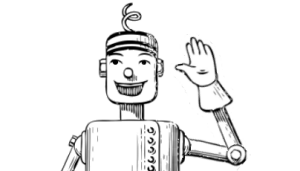[I was recently challenged to write some flash fiction about bots; I’ve expanded the result to make a short story in 14 parts. The parts are mildly thoughtful to varying degrees, so I thought you might possibly like them as a bit of a supplement to my normal sober discussions. So here we go! – Peter]
The one thing you don’t really do is love, of course. Isn't that right, Love Bot? All you do is sex, isn't it? Emotionless, mechanical sex.
“You want it mechanical? This could be your lucky day. Come on, big boy.”
Why did they call you ‘Love Bot’ anyway? Were they trying to make it all sound less sordid?
“Call me ‘Sex Bot’; that’s what people usually do. Or I can be ‘Maria’ if you like. Or you choose any name you like for me.”
Actually, I can’t see what would have been wrong with calling you ‘Sex Bot’ in the first place. It’s honest. It’s to the point. OK, it may sound a bit seedy. Really, though, that’s good too, isn't it? The punters want it to sound a bit dirty, don’t they? Actually, I suppose ‘Love Bot’ is no better; if anything I think it might be worse. It sounds pretty sordid on your lips.
“Oh, my lips? You like my lips? You can do it in my mouth if you like.”
In fact, calling you ‘Love Bot’ sounds like some old whore who calls everybody ‘lover boy’. It actually rubs your nose in the brutal fact that there is no love in the transaction; on your side there isn't even arousal. But is that maybe the point after all?
“You like it that way, don’t you? You like making me do it whether I want to or not. But you know I like that too, don’t you?”
It reminds the customer that he is succumbing to an humiliating parody of the most noble and complex of human relationships. But isn’t that the point? I think I’m beginning to understand. The reason he wants sex with robots isn't that robots are very like humans. It isn't that he wants sex with robots because he loves and respects them. Not at all. He wants sex with robots because it is strange, degrading, and therefore exciting. He is submitting himself willingly to the humiliating dominance of animal gratification in intercourse that is nothing more than joyless sexual processing.
“It doesn’t have to be joyless. I can laugh during the act if you would enjoy that. With simple joy or with an edge of sarcasm. Some people like that. Or you might like me to groan or shout ‘Oh God, oh God.’”
I don’t really see how a bitter mockery of religion makes it any better. Unless it's purely the transgressive element? Is that the real key? I thought I had it, but I have to ask myself whether it is more complicated than I supposed.
“OK, well what I have to ask is this: could you just tell me exactly what it is I need to do or say to get you to shut up for a few minutes, Enquiry Bot?”

 Scott Bakker has a thoughtful
Scott Bakker has a thoughtful